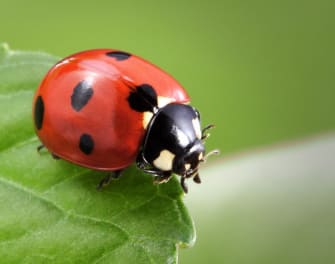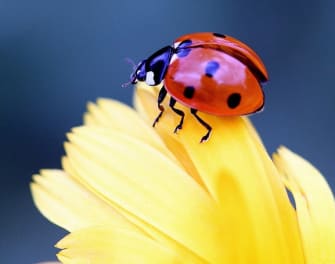As soon as the weather warms up and summer annuals are filling the tables, we begin to get calls asking if Ladybugs are available. On Long Island everyone refers to these insects as ladybugs however they're also call Lady beetles and Ladybird beetles.

I love the story of how they got their name. Ladybugs are native to Europe and were introduced into the Americas in mid 1900's. European Farmers used to pray to the Virgin Mary when pests began to eat their crops. Usually without fail, the Lady beetles would emigrate into the fields and suppress the damaging pests. As the "miracle" was observed, thanks were given for the "beetle of Our Lady" or Ladybeetle for short.
Decker's Nursery offers ladybugs for sale and we advocate their use as a pest control. Keep in mind they will not control every pest like caterpillars or other beetles. However, during my 30 years of caring for landscapes, I've observed Ladybugs to be an effective pest control. They probably control 60-75% of the most common pests that compromise ornamental gardens.
The more I observed pest outbreaks the more obvious it became, they occurred as a result of persistent chemical treatments. These chemical treatments often eliminated the ladybugs that kept everything in balance. Broad spectrum pesticides don't differentiate between good and bad insects.. Properties that persistently treated for ticks with chemical treatments, often have high pest levels as a result of killing the beneficial insects simultaneously.
Ladybugs feed primarily on aphids and soft bodied insects such as scale insects, mealybugs, and spider mites. Some species also eat the eggs of the Colorado Potato Beetle and European Corn Borer.
On Long Island, there are no products licensed for homeowners to control adult mites. Horticultural Oil will suffocate a lot of their eggs and disrupt the life cycle; however anyone that has an Alberta Spruce knows the damage from adult mites is swift and devastating. Ladybugs can prevent mite damage
Scale insects are a common pest on ornamental plantings. They're populations are cyclical and unpredictable. Scale is most visible when they create a sooty mold on the leaves of plants. It's unsightly and compromises the plants ability to photosynthesize properly. As long as you pay attention to your plants, you will see this damage. The biggest challenge with controlling scale insects is getting the optimum timing. Having ladybugs established in your landscape is an effective way to prevent scale damage.

Now that you're aware of the benefits of Ladybugs; how can you attract them to your property.
1. Providing alternative food supplies like nectar will entice them to stay. Consider planting brightly-colored flowers like Cosmos, Geraniums, Zinnia and Marigolds in your garden. The leaves of these flowering plants may also provide shelter.
2. Mount a Ladybug House near or in your garden. Decker's Nursery offers a variety of different habitats and some will attract other types of beneficial insects as well as pollinators.
3. Do Not Use Pesticides if you're trying to attract Ladybugs. Big No-No. If you trust your ladybugs, I'm confident they won't let you down and the need for pesticides is likely to be eliminated.
4. All living organisms require water to survive. Some more than others. Ladybugs spend a part of each day seeking water as well as food. Leaving some wet cloths in your garden is likely to make a Ladybug grateful. Dew on leaves is a common source of water and you can replicate dew by spraying your plants with water. Look for plants in your garden that are specialized in gathering moisture and wet them periodically.
If you decide to release Ladybugs into your gardens, one of the best ways to keep them nearby is to spray your plants with water prior to releasing them. This provides a hospitable environment. Survival is all they consider so a cool beverage is a nice thing to offer your new house guests..
Schedule the release of your Ladybugs at dusk. Releasing them in the heat of day will encourage them to leave the property. Let them get a good nights sleep and they're likely to keep you good company.
